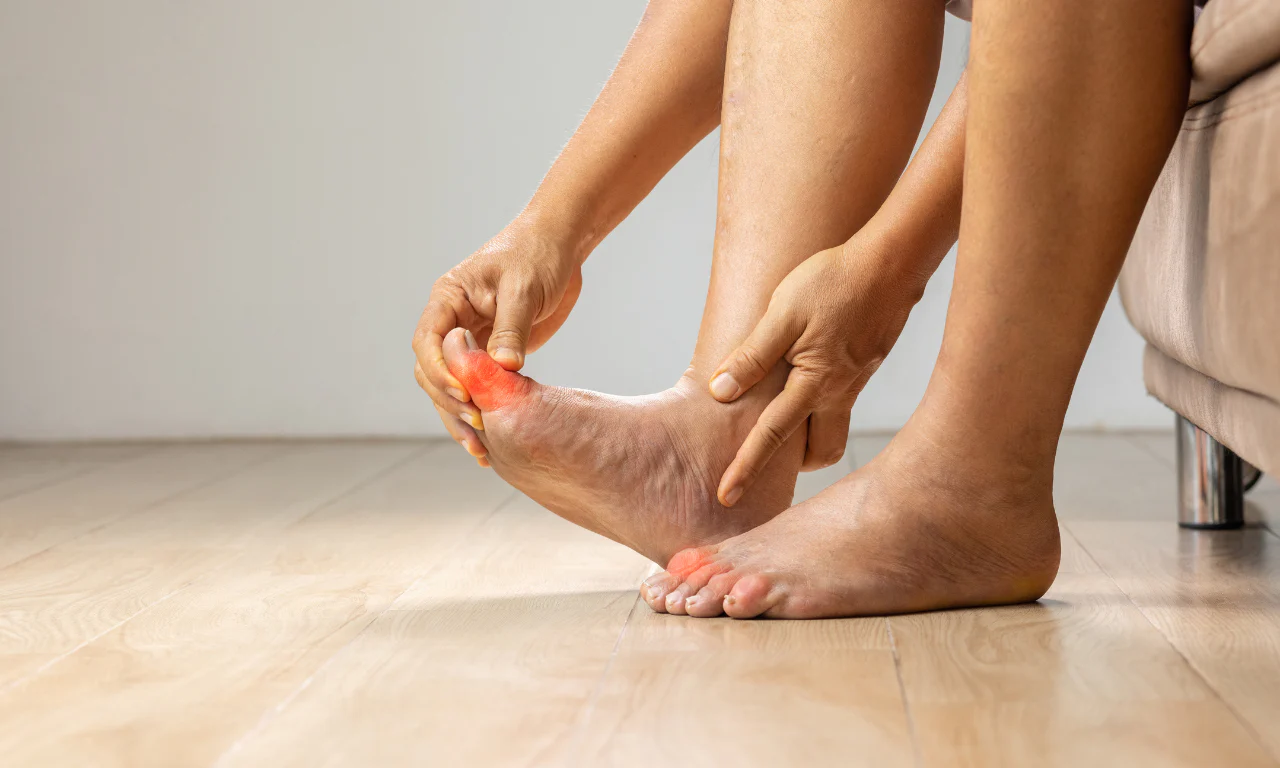
Key facts
- Gout is a type of arthritis that leads to painful inflammation in a joint, caused by a build-up of urate crystals.
- The big toe is most commonly affected, but gout can affect any joint.
- To diagnose gout, a sample of fluid from the affected joint can be checked for urate crystals.
- Your doctor can prescribe medicines to relieve your symptoms and shorten their duration.
- If you have recurrent attacks of gout, your doctor can advise you on ways to reduce the risk of future attacks.
What is gout?
Gout is a type of arthritis that leads to painful inflammation in a joint. The big toe is most commonly affected, but gout can also affect the hands, wrists, knees, ankles, elbows or any other joint.
What are the symptoms of gout?
The symptoms of gout include:
- pain in a joint, which can be quite severe
- swelling around the joint, which can feel tender
- warmth and redness of the skin over the affected joint
- restricted movement of the joint
These symptoms usually develop quickly and can last for 1 – 2 weeks.
What causes gout?
Gout is caused by a build-up of uric acid (also known as ‘urate’) that causes swollen, sore joints.
Uric acid is a normal waste product typically found in the blood. It comes from the breakdown of cells, DNA and the food and drinks you consume.
Uric acid builds up either because your kidneys do not excrete it quickly enough, or because too much is being produced. Excess uric acid can form crystals in your joints. Gout occurs when these crystals cause sudden and severe inflammation in the joint.
What are the risk factors for gout?
You are more likely to develop gout if you:
- are male
- are post-menopause
- are older than 65 years of age
- have close family members who have had gout
- have high levels of uric acid in your blood
Lifestyle factors that increase your risk of gout include:
- being overweight
- eating a diet that includes a lot of meat, offal and shellfish
- drinking a lot of alcohol, especially beer, port or spirits
- going on a crash diet or fasting
Factors that affect your kidney function can also increase your risk of gout. These factors may include:
- being dehydrated
- taking medicines known as diuretics (medicines that increase water excretion by the kidneys)
- having kidney disease, high blood pressure
How is gout treated?
The treatment of gout may include pain-relieving medicines, usually non-steroidal anti-inflammatory medications (NSAIDs). Aspirin is not recommended. In some cases, your doctor may prescribe other medicines to quickly relieve the pain and reduce the swelling and redness.
You can also provide relief from gout symptoms at home. Applying ice and elevating the joint can help ease the pain.
It is also important to rest the joint, and to protect the joint area from further damage.
Prompt treatment will help provide relief for symptoms of acute gout and prevent complications.
Without treatment, symptoms of gout will usually last for about a week. You may not have another attack for months or years.
What are the complications of gout?
Over time, recurrent attacks of gout can cause irreversible damage to the joint and the nearby bone.
They can also cause kidney stones, kidney damage and ‘tophi’ — solid lumps of urate crystals often found in the ears, fingers, hands, forearms, knees and elbows.
Can gout be prevented?
Some people with gout experience recurrent attacks, which may be prevented by using prescription medicines. These medicines work by lowering uric acid levels in the blood. The most commonly used medicine is allopurinol. This helps to lower uric acid levels by reducing the body’s production of uric acid.
You can also reduce your chance of having further attacks of gout by adopting some lifestyle changes, such as:
- reducing alcohol intake — in particular, avoiding binge drinking
- gradually losing weight if you are overweight, while avoiding fad diets
- eating a healthy, balanced diet
- drinking plenty of water, especially when at risk of dehydration (such as when you are sick or travelling on a plane)
Gout and diet
There is no scientific evidence that particular foods cause gout. However, some studies have shown that people who have gout are more likely to eat foods rich in purines — a substance that is converted into uric acid within the body.
Foods with high levels of purines include:
- red meat and offal such as liver, kidneys and heart
- seafood, especially shellfish, scallops, mussels, herring, mackerel, sardines and anchovies
- foods containing yeast such as Vegemite and beer
It’s best to seek the advice of your doctor or dietitian before making any changes to your diet. Most people with gout find that a healthy, balanced diet — along with medicine — is enough to reduce their uric acid levels.
, diabetes or high levels of cholesterol in the blood
Gout can also affect people with certain types of blood disorders (such as the blood cancers leukaemia and lymphoma) and people receiving treatment for some cancers.
How is gout diagnosed?
If your doctor suspects gout, they may take a sample of fluid from the joint with a thin needle and send it to a laboratory for tests. If you have gout, the laboratory will report urate crystals in the fluid.
A blood test may also show elevated levels of uric acid, although you can have high uric acid blood levels without having gout.
X-rays aren’t usually used to diagnose gout. If you have recurrent attacks of gout, your doctor may refer you for an x-ray to assess if any damage has been done to the affected joint.
How is gout treated?
The treatment of gout may include pain-relieving medicines, usually non-steroidal anti-inflammatory medications (NSAIDs). Aspirin is not recommended. In some cases, your doctor may prescribe other medicines to quickly relieve the pain and reduce the swelling and redness.
You can also provide relief from gout symptoms at home. Applying ice and elevating the joint can help ease the pain.
It is also important to rest the joint, and to protect the joint area from further damage.
Prompt treatment will help provide relief for symptoms of acute gout and prevent complications.
Without treatment, symptoms of gout will usually last for about a week. You may not have another attack for months or years.
What are the complications of gout?
Over time, recurrent attacks of gout can cause irreversible damage to the joint and the nearby bone.
They can also cause kidney stones, kidney damage and ‘tophi’ — solid lumps of urate crystals often found in the ears, fingers, hands, forearms, knees and elbows.
Can gout be prevented?
Some people with gout experience recurrent attacks, which may be prevented by using prescription medicines. These medicines work by lowering uric acid levels in the blood. The most commonly used medicine is allopurinol. This helps to lower uric acid levels by reducing the body’s production of uric acid.
You can also reduce your chance of having further attacks of gout by adopting some lifestyle changes, such as:
- reducing alcohol intake — in particular, avoiding binge drinking
- gradually losing weight if you are overweight, while avoiding fad diets
- eating a healthy, balanced diet
- drinking plenty of water, especially when at risk of dehydration (such as when you are sick or travelling on a plane)
Gout and diet
There is no scientific evidence that particular foods cause gout. However, some studies have shown that people who have gout are more likely to eat foods rich in purines — a substance that is converted into uric acid within the body.
Foods with high levels of purines include:
- red meat and offal such as liver, kidneys and heart
- seafood, especially shellfish, scallops, mussels, herring, mackerel, sardines and anchovies
- foods containing yeast such as Vegemite and beer
It’s best to seek the advice of your doctor or dietitian before making any changes to your diet. Most people with gout find that a healthy, balanced diet — along with medicine — is enough to reduce their uric acid levels.


